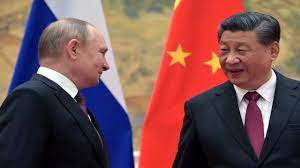Russia-China G20 Jugalbandi: Putin and Xi’s Concerted Absence from the Delhi Summit and Intentional Ignorance of India?
In a phone conversation with Prime Minister Narendra Modi last week, Russian President Vladimir Putin informed him that he would not be attending the G20 conference in early September in person. In actuality, Putin has not left Russia since the start of the conflict with Ukraine in February 2022. He has been to Belarus and other former Commonwealth of Independent States (CIS) nations including Tajikistan, Turkmenistan, and Uzbekistan on a few unusual and extraordinary occasions. Additionally, he made a rare journey to Tehran. Sergey Lavrov, Putin’s foreign minister, will go to Delhi in its place.
In addition, the Chinese President Xi Jinping is not expected to go to New Delhi for the G20 conference, according to a Thursday report from Reuters. Xi has been plagued by a number of economic problems at home, including a slowing economy, a lack of employment opportunities for young Chinese, and a full-blown real estate crisis affecting big developers. Who China will send to replace Xi is unclear.
The presidents of China and Russia chose not to attend the G20 conference, which India is hosting, underscoring the complex global dynamics at work. There has been a widening gap between Western and non-Western states ever since the Ukraine conflict started. This action underscores how significant powers like Russia and China are deliberately maneuvering to undermine the dominance of Western-centric forums, as well as the geopolitical tug of war between these two sides. On Thursday, Moscow released a statement criticizing the West for exploiting gatherings like the G20 and the G7 to spew unfounded accusations against China and Russia. Despite the fact that the choices were made individually, India still cannot completely rule out Sino-Russian jugalbandi as a factor.
The Western nations have historically been crucial in determining the agenda and choices of the G20 as a forum, especially the United States and its allies. In reality, in reaction to the Asian financial crisis, the first G20 summit was held in Berlin in 1999. However, it quickly gained international attention during the 2008 financial crisis. The G20 has evolved from being a meeting place for finance ministers and governors of central banks to the primary forum for the most influential political figures in the globe. However, the leaders of Russia and China made the choice to skip the summit in India, demonstrating their desire to disrupt the conventional Western-aligned paradigm.
Russia and China’s partnership has become stronger in recent years, and it is characterized by a common goal of thwarting Western dominance and advancing multipolarity. Russia and China are expressing their dissatisfaction with the present global power structure by working together to resist legitimizing Western-dominated conferences like the G20. They want to depart from the dominant Western narrative and establish new, inclusive, and representative channels for discussion and decision-making.
This creates a problem for nations like India that try to maintain a neutral posture in the international community. India, which is hosting the G20 conference, is torn between supporting Western allies and upholding its own interests. This predicament serves as an example of the larger problem that many nations confront when trying to manage their diplomatic activities without taking sides in the developing rivalry between Washington and Beijing.
Russia and China are working together to promote alternatives to Western-dominated platforms, as seen by their focus on their own forums like the Shanghai Cooperation Organization (SCO) and the BRICS alliance that also includes Brazil, India, and South Africa. With these efforts, developing economies will have a place to discuss important topics without having to adhere to Western beliefs or agendas. The United States received a signal that it is not the only decider of power dynamics in some of the less desirable regions of the globe with the recent expansion of BRICS to include nations from Africa and the Arab world.
Russia and China are successfully defining the boundaries for future confrontations by using organizations like the SCO and BRICS. The conflict in Ukraine has made the West more cautious about how quickly it can achieve achievements. Ukraine has been unable to drive back Russia even after a year and a half and billions of dollars in Western military assistance. In actuality, it has lost around 20% of its territory and is unlikely to reclaim those areas very soon.
This has consequences for a potential confrontation in Taiwan in the future. China has been keenly monitoring the conflict between Russia and Ukraine to determine how far it might push the West. It will support Xi Jinping’s plan to militarily invade Taiwan if Russia is successful in holding on, which it now seems to be doing successfully. There are no assurances, notwithstanding the US’s claim that it is obligated to protect Taiwan in light of what occurred in Ukraine.
As the host nation for the G20 conference this year, India would thus want to resolve some of these disputes. However, given how China and Russia have behaved, it is probable that the flaws that were originally shown in Bali will only become more obvious in Delhi. The opposite is not true.







